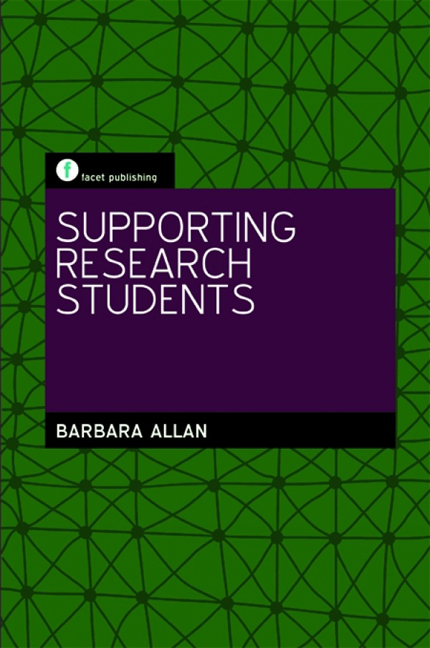Book contents
- Frontmatter
- Contents
- List of figures
- List of tables
- Acknowledgements
- 1 Introduction
- 2 Research and the research process
- 3 The research student's experience
- 4 Moving forward and completing the research
- 5 Research skills training
- 6 Supporting research students in academic libraries and information services
- 7 Virtual graduate schools
- 8 Introduction to research communities
- 9 Professional development
- Conclusion
- References and bibliography
- Index
6 - Supporting research students in academic libraries and information services
Published online by Cambridge University Press: 09 June 2018
- Frontmatter
- Contents
- List of figures
- List of tables
- Acknowledgements
- 1 Introduction
- 2 Research and the research process
- 3 The research student's experience
- 4 Moving forward and completing the research
- 5 Research skills training
- 6 Supporting research students in academic libraries and information services
- 7 Virtual graduate schools
- 8 Introduction to research communities
- 9 Professional development
- Conclusion
- References and bibliography
- Index
Summary
Introduction
Many academic library and information workers are involved in supporting research students. This chapter explores different approaches to supporting research students, including induction, workshops, one-to-one support and electronic support. Approaches to targeting and communicating with research students are also considered. Towards the end of this chapter, a self-assessment inventory is provided which will enable you to identify your approaches to supporting research students. It will be a tool for reflection and for the identification of potential areas of development as well as areas of good practice which might be shared across the information services sector.
The information presented in this chapter is based on research into current practice through visits (physical and virtual) to a range of academic libraries, and also informal discussions with colleagues who have attended my workshops on ‘Supporting Research Students’ at CILIP. The range of support offered to research students varies, depending on the type of university, the focus of the library and information services, the numbers of research students and the development plans of the institution. Many institutions are now focusing on developing and expanding their research activities and increasing their numbers of research students. For these institutions, enhancing the support available to research students is high on their agenda.
While the levels and types of support for taught students appear to be fairly similar across different universities, it soon became apparent to me that there is much less uniformity in terms of provision of support for research students. The self-assessment inventory at the end of this chapter brings together all the different ways in which library and information workers are supporting research students. As this is a constantly developing field, the different ways in which these students are supported will continue to grow and develop.
Information needs
Barry (1997) argues that research students have the greatest information needs and therefore, of all students, the greatest need for information skills. She suggests that their information needs are even greater than those of established academics, as they need to provide comprehensive and up-to-date literature reviews in their theses.
- Type
- Chapter
- Information
- Supporting Research Students , pp. 95 - 122Publisher: FacetPrint publication year: 2009



